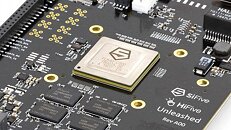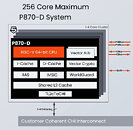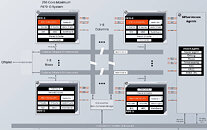- Joined
- May 21, 2024
- Messages
- 935 (3.36/day)
Today SiFive, Inc., the gold standard for RISC-V computing, announced its new SiFive Performance P870-D datacenter processor to meet customer requirements for highly parallelizable infrastructure workloads including video streaming, storage, and web appliances. When used in combination with products from the SiFive Intelligence product family, datacenter architects can also build an extremely high-performance, energy efficient compute subsystem for AI-powered applications.
Building on the success of the P870, the P870-D supports the open AMBA CHI protocol so customers have more flexibility to scale the number of clusters. This scalability allows customers to boost performance while minimizing power consumption. By harnessing a standard CHI bus, the P870-D enables SiFive's customers to scale up to 256 cores while harnessing industry-standard protocols, including Compute Express Link (CXL) and CHI chip to chip (C2C), to enable coherent high core count heterogeneous SoCs and chiplet configurations.



The P870-D processor enables the creation of infrastructure SoCs with higher compute density compared to the competition, offering improved performance per watt metrics for workloads that require the execution of multiple compute tasks in parallel. As a result, SiFive's P870-D offers advantages in total cost of ownership, which is especially important as the industry is looking for ways to lower the cost of training AI models. Additionally, the power-efficiency of the P870-D aligns with the industry's growing focus on sustainability.
SiFive is working with a number of ecosystem partners to help further streamline the development of complete systems. For example, Arteris has collaborated with SiFive as a lead partner to deliver emulation-ready reference design with the X280 and P870-D processors as the first products to validate the platform. By integrating SiFive's RISC-V based processors with Arteris' Network-on-Chip (NoC) IP, SiFive's customers can accelerate development and get their products to market faster.
SiFive also added Reliability Availability Serviceability (RAS) features to the P870-D. These RAS features are designed to detect errors before an issue arises and protect data integrity, helping to prevent downtime and ensure the overall reliability of the system. Additionally, the P870-D includes a distributed and scalable IOMMU for accelerating virtualized device IO, which is also critical to address the latest functional safety and security requirements.
Key Features:
From a software perspective, customers that create datacenter platforms harness a combination of open source software and first party software. Many of the foundational open source software elements already exist for RISC-V and this momentum is accelerating due to the collaborative efforts across the community such as the RISE Project. The P870-D processor is aligned with the platform and profile standards defined by RISC-V International which enables customers to utilize this software for their designs, saving time, cost, and increasing the chances of program success.
To further accelerate the development process, customers can leverage SiFive's standard run-control debug capabilities, along with supported debugging solutions from leading tool vendors. To secure P870-D designs, SiFive's customers can take advantage of the open WorldGuard model, which helps streamline the process of enabling a Trusted Execution Environment (TEE).
The P870-D processor is sampling to lead customers now with a final production release by the end of 2024.
View at TechPowerUp Main Site | Source
Building on the success of the P870, the P870-D supports the open AMBA CHI protocol so customers have more flexibility to scale the number of clusters. This scalability allows customers to boost performance while minimizing power consumption. By harnessing a standard CHI bus, the P870-D enables SiFive's customers to scale up to 256 cores while harnessing industry-standard protocols, including Compute Express Link (CXL) and CHI chip to chip (C2C), to enable coherent high core count heterogeneous SoCs and chiplet configurations.



The P870-D processor enables the creation of infrastructure SoCs with higher compute density compared to the competition, offering improved performance per watt metrics for workloads that require the execution of multiple compute tasks in parallel. As a result, SiFive's P870-D offers advantages in total cost of ownership, which is especially important as the industry is looking for ways to lower the cost of training AI models. Additionally, the power-efficiency of the P870-D aligns with the industry's growing focus on sustainability.
"SiFive brings a clean, modern approach to the AI era with our broad portfolio of RISC-V solutions. The new P870-D enhances our proven Performance architecture to bring new levels of performance, flexibility, and scalability," said John Ronco, SiFive SVP of Product. "The full solution offering from SiFive -- including software, IOMMU, interrupt controller and other uncore blocks -- combined with our intelligence processors for dedicated AI compute makes it easy for our customers to achieve the most effective performance/watt/dollar metrics on AI and Datacenter workloads"
"Energy efficiency is going to be a major factor for data center architects for the foreseeable future; This is a clear differentiator for RISC-V and why we expect the architecture to play a major role in the continued growth of high-performance data center processing," said Edward Wilford, Senior Research Director, Omdia. "We forecast that more power-efficient data center processors will make up over 40% of the market by volume in 2030, driven by the growth of open-source software and open-standard architecture."
SiFive is working with a number of ecosystem partners to help further streamline the development of complete systems. For example, Arteris has collaborated with SiFive as a lead partner to deliver emulation-ready reference design with the X280 and P870-D processors as the first products to validate the platform. By integrating SiFive's RISC-V based processors with Arteris' Network-on-Chip (NoC) IP, SiFive's customers can accelerate development and get their products to market faster.
"Network-on-Chip IP significantly helps streamline the process of building complex, multi-core heterogeneous SoCs with the lowest latency and high bandwidth to accommodate AI workloads," said Michal Siwinski, CMO of Arteris. "We are pleased to continue the collaboration with SiFive, enabling the ecosystem to create high-performance and low-power RISC-V-based systems on time and budget while reducing risk."
SiFive also added Reliability Availability Serviceability (RAS) features to the P870-D. These RAS features are designed to detect errors before an issue arises and protect data integrity, helping to prevent downtime and ensure the overall reliability of the system. Additionally, the P870-D includes a distributed and scalable IOMMU for accelerating virtualized device IO, which is also critical to address the latest functional safety and security requirements.
Key Features:
- Delivers compute on demand with solutions scalable to 256 cores.
- Fully compatible with the RVA23 profile, enabling system developers to leverage a breadth of operating systems, toolchains, and application software frameworks, which improves time to market while reducing program risk and development costs.
- Supports the RISC-V Sv57 extension to enable 57-bit virtual address space support
- Supports 4 CHI ports/clusters and a wider link for multiple peripheral and memory device ports.
- Integrates an Advanced Interrupt Architecture (AIA) compliant interrupt controller with support for Message Signal Interrupts (MSI) and virtualization.
From a software perspective, customers that create datacenter platforms harness a combination of open source software and first party software. Many of the foundational open source software elements already exist for RISC-V and this momentum is accelerating due to the collaborative efforts across the community such as the RISE Project. The P870-D processor is aligned with the platform and profile standards defined by RISC-V International which enables customers to utilize this software for their designs, saving time, cost, and increasing the chances of program success.
To further accelerate the development process, customers can leverage SiFive's standard run-control debug capabilities, along with supported debugging solutions from leading tool vendors. To secure P870-D designs, SiFive's customers can take advantage of the open WorldGuard model, which helps streamline the process of enabling a Trusted Execution Environment (TEE).
The P870-D processor is sampling to lead customers now with a final production release by the end of 2024.
View at TechPowerUp Main Site | Source


